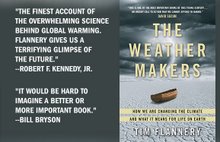PREAMBLE: This issue draws attention to the apparent disregard for nuclear safeguards recently revealed by Canada’s “new” government. The minority Conservative government’s failure to respect the role of the Canadian Nuclear Safety Commission puts into question whether Canada takes nuclear safety seriously. For a synopsis of this episode, we paraphrased and updated the core content of a January 2008 article in The Star by Walkom (acknowledged below). Further down, we summarize a report from the Canadian Medical Association Journal that reveals the manipulative attitude of the Canadian medical isotope industry, paraphrased from a CTV News report. The main story is how Canada’s government put politics ahead of public health and safety. Clearly there are questionable commercial and political practices in Canada at present.
For late breaking news on this story, visit our sidebar.
CANADA’S AND NUCLEAR SAFETY – FIRE THE MESSENGER!
OTTAWA Jan 17, 2008: Doubts have been raised among experts around the world about Canada's ability to effectively regulate reactors, uranium mines, fuel manufacturers and other potentially dangerous installations. This is because Prime Minister Stephen Harper says that his Conservative government fired the country's top nuclear regulator for not doing her job. However, to the contrary, the evidence reveals that Canadian Nuclear Safety Commission (CNSC) head Linda Keen was fired because she was doing her job. As specified in the Nuclear Safety and Control Act, this was to ensure that radioactive material is created and used safely.
Two years ago, CNSC renewed Atomic Energy of Canada Ltd.'s (AECL) operating licence for a reactor at Chalk River (Ontario) that produces medical isotopes. As a condition of licensing, AECL was required to upgrade safety systems on the 50-year-old reactor by installing two new pumps. During a routine inspection in November 2007, inspectors found that the pumps had not been installed. CNSC shut the reactor down so that AECL would comply with its order.
Then media stories began to appear suggesting that Canada faced a severe isotope shortage that could lead to some medical tests and treatments being delayed. This promptly became a cause celebre for federal politicians seeking to make political hay of the regulatory agency. However, despite some local isotope shortages (that could have been averted by better federal-provincial health service planning) there is no record of anyone's health being harmed during this “crisis”. By the time politicians inserted themselves, AECL had already installed one of the pumps and was readying the second. On December 11, an AECL official told the House of Commons that the necessary safety upgrades could be completed with just 16 more days of reactor down time. Shortly after, Prime Minister Stephen Harper accepted the resignation of Michael Burns, chair of AECL (a heavily subsidized but under-funded Crown corporation), effective Dec 31.
The government's “case” against the regulatory agency, articulated by Natural Resources Minister Gary Lunn at a Commons committee (January 16), is that it was Keen's job to get Chalk River up and running. In fact, as the minister responsible for AECL, that task belonged to him. Lunn's additional “arguments” also make little sense. He characterized AECL's failure to meet the CNSC safety standards as a "dispute" between two agencies – which is rather like suggesting that someone who breaks the law is having a "dispute" with the judge! He also insisted the issue was one of "licensing" rather than safety, even though the rationale for licensing a reactor is to ensure its safe operation! And he made the disturbing claim, not reflected in law, that the government has the right to fire any head of the regulatory commission at will and without cause even though this would render impotent CNSC as a quasi-judicial commission that has its own legal mandate for good reason.
The game being played by Harper’s Conservatives is highly questionable. Green Leader Elizabeth May is probably close to the truth when she says he is trying to defang the regulatory watchdog at the behest of Canada's nuclear industry.
Source: Adapted from Thomas Walkom. The Star. Jan 17, 2008. http://www.thestar.com/News/Canada/article/294886
HOW CANADA COULD HAVE AVOIDED THE ISOTOPE "CRISIS"
CTV NEWS: Canada could have avoided the alleged isotope “crisis” if Canadian supplier MDS Nordion had joined international efforts to co-ordinate global production, a report in the Canadian Medical Association Journal (CMAJ) says. This states that MDS Nordion wouldn't co-operate with Europe's two large isotope suppliers (Nuclear Research and Consultancy Group in the Netherlands, and the Institut National des Radioelements in Belgium). These suppliers share concerns about safety and distribution, and co-ordinate production schedules to ensure one reactor is always running. They also communicate with another isotope supplier, Nuclear Technology Products in South Africa but apparently can't pry information out of MDS Nordion, which provides about half the world's supply, made at AECL’s Chalk River reactor.
Kevin Charlton of the Netherlands' Nuclear Research and Consultancy Group told CMAJ that "Nordion is represented at our meetings. (But) either AECL doesn't tell Nordion or they don't allow Nordion to tell us.'' The CMAJ article says Nordion did not grant an interview for the piece, but quoted an e-mail message in which Nordion said it was "focused and committed to providing medical isotopes to the medical community." Neither AECL or MDS Nordion responded to requests for reaction to the report in the CMAJ.
As reported in our opening article (above) the federal government instead very noisily laid the entire blame for the shortage on the nuclear regulatory agency! It fired CNSC president Linda Keen, arguing that she failed to take into account the impact of the reactor closure on isotope supply. Keen says she couldn't authorize the startup of the reactor because she was legally bound to ensure the safety of Canadians from nuclear accidents. Health Minister Tony Clement maintained the government had no choice but to legislate reopening the reactor given Keen's “intransigence” and the “absence of an alternate supply”. He insisted that the four other isotope-producing reactors in the world could not have filled the gap left by the Chalk River shutdown.
In contradiction to Canada’s Conservative politicians, University of Texas Professor Alan J. Kuperman, Policy Analyst for the Nuclear Control Institute in the United States, told CMAJ it's not in MDS Nordion's commercial interests to join in international contingency planning with rival suppliers. "They see themselves as the big dog,'' said Kuperman. ''They are not going to share information with the small ones nipping at their heels.'' Kuperman maintained there is plenty of "surplus capacity'' among isotope suppliers but MDS Nordion and AECL didn't want competitors to pick up the slack when the AECL reactor was shut down. "Instead, they went to the public and the Canadian government. That was misleading and… socially irresponsible.''
Source: The Canadian Press Mon. Feb. 4 2008 8:32 PM ET http://www.ctv.ca/servlet/ArticleNews/story/CTVNews/20080131/chalk_river_080204/20080204?hub=Canada&s_name=
Editorial Comment:
So who to believe in this vaudeville production - the politicians and their industry bed-fellows, or the scientists and regulators? To the extent that there was an incipient health care crisis, the actual shortage of medical isotopes appears to have been minimal and would have been contained without political posturing. Fundamentally, there would have been no “crisis” if the respective Conservative Ministers for Natural Resources and Health had been doing their jobs. Instead, as a smokescreen for their own negligence and incompetence, vicarious though these may be as is Harper's ultimate responsibility for AECL as a Crown corporation (although to his credit, AECL President Burns resigned for that), they fired the regulator! Unbelievable? Sadly no, comic opera is in the Canada's “new” political tradition.
Given that AECL’s Chalk River reactor is the world’s largest supplier of medical isotopes, and its uncooperative behaviour (as documented by CMAJ), it has been speculated that Canada’s Conservative government was acting in cahoots with AECL and MDS Nordion to protect a lucrative export market, and needed a scapegoat. The end result of this raucous episode, designed to sow confusion over whose role it really is to do what, is to attract world attention to Canada’s willingness to sacrifice nuclear safety to the whims of politics and commercial profit. One likely outcome is that Canada will now face new, more ethical and more scientifically advanced (e.g., cyclotron technology) competition from other countries capable of scaling up isotope production.
On the abuse of a senior public servant acting with due diligence, the episode revealed the unsavoury mindset of a Prime Minister on the brink of mendacity when he almost unbelievably alleged that the regulatory decision was “partisan” because Keen was appointed by the previous government! This crass use of the bully pulpit exposes the PM for the partisan “leadership” he himself so clearly personifies. As for the unmanly Cabinet ministers busily holding his coattails, having fallen so short of the responsibilities required of their own portfolios, their instincts for political survival apparently led them to embellish this complex cover-up.
Except for the fact that the underlying issue of nuclear safety is so important, the whole episode could be rewritten as a farce (definition: a light dramatic work in which highly improbable plot situations, exaggerated characters, and often slapstick elements are used for humorous effect); but even then we would need better actors than currently offered up by Canada’s “new” government.
Due to the critical debate on Canada’s role Afghanistan, which diverted media attention immediately following this fiasco, the Conservatives may have escaped the full measure of public scrutiny that this deserved. For this reason, we are shining this light on the story for our global readers so that they may be aware of the kind of governance we are now experiencing in Canada.
At least one good thing comes out of this experience: the example of the principled Ms Keen on standing by her duty as the nuclear regulator. Despite being undermined by federal politicians, as a leader in her field (biosketch below), she wins respect from the science policy community.
The issue has not gone away, and there are calls for a public inquiry. However, most of the political parties are keeping their heads down now; the only party to have shown much gumption on the issue is the Green Party of Canada. It could well return as an election issue.
BIOSKETCH – Linda Keen
Linda J Keen was President of the CNSC since January 2001, and her term was renewed in 2005. As President, she chaired a quasi-judicial tribunal that sets regulatory policy and makes licensing decisions related to nuclear facilities. With 4,500 licenses covering all aspects of the industry from mining to refining, power and research reactors to clinics and industrial uses, CNSC provides regulatory oversight on behalf of Canadians. The CNSC is also the Canadian agency that implements measures respecting international control of the development, production, transport and use of nuclear energy and substances. The CNSC is crucial to Canada’s adherence to global agreements respecting the non-proliferation of nuclear weapons and explosive devices.
Ms. Keen was Chair of the International Nuclear Regulators Association (INRA) in 2003. She is now President of the Convention on Nuclear Safety, involving international peer review among 65 signatory countries to ensure worldwide nuclear safety. She was Honorary Chair of the 2006 Women in Nuclear Conference, held in Canada for the first time, and the keynote speaker of the 2005 International Conference of Women in Science and Engineering held in Seoul, South Korea. In January 2007, Ms. Keen was instrumental in establishing the Heads of Federal Administrative Tribunals Forum and is serving as the first Chair of this network. She was appointed in May 2007 as a director of the Canadian Council of Administrative Tribunals.
Source: http://209.85.173.104/search?q=cache:V1LSrNXXj8AJ:www.cnsc-ccsn.gc.ca/eng/about/organization/ljkeen/+linda+keen&hl=en&ct=clnk&cd=1&gl=ca
FROM a Great Canadian and World Statesman
"A great gulf... has... opened between man's material advance and his social and moral progress, a gulf in which he may one day be lost if it is not closed or narrowed..."
Lester B Pearson
http://nobelprize.org/nobel_prizes/peace/laureates/1957/pearson-lecture.html
Friday 15 February 2008
Subscribe to:
Posts (Atom)
INSPIRATIONAL WELCOME ............................... from T.S.Eliot's "Little Gidding"
If you came this way From the place you would come from... It would be the same at the end of the journey...
If you came, not knowing what you came for, It would be the same... And what you thought you came for Is only a shell, a husk of meaning... From which the purpose breaks only when it is fulfilled If at all.




















